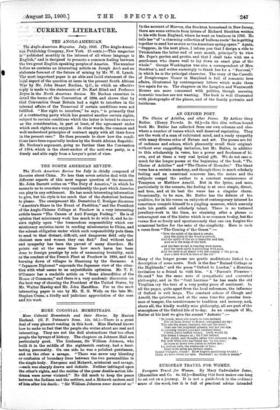AN OXFORD POET.
The Choice of Achilles, and other Poems. By Arthur Gray Butler. (Henry Frowde. 2s. 6d.)—In this slim vellum-bound book Mr. Butler has collected from our own columns and else- where a number of verses which well deserved reprinting. They are the work of a man of cultivated mind, and a ready sympathy with many diverse sides of Natare and art. The poems are fur of cadences and echoes, which pleasantly relall their originali without ever suggesting imitation, but Mr. Butler, in addition to this scholarship in verse, has a power and freshness of hi. own, and at times a very real lyrical gift. We do not care st much for the longer poems at the beginning of the book, " Tin Choice of Achilles" and " The Choice of Heracles.." The blank verse has a certain monotony, and though there is much scholarly feeling and an occasional sonorous line, the metre and the subjects compel the author to a constant reminiscence of Tennyson or Matthew Arnold. But in the lyrics, and more particularly in the sonnets, the feeling is at once simple, direct, and true, and at its best the verse has a singular charm. Occasionally, to be sure, Mr. Butler has the defects of his qualities, for in his verses on subjects of contemporary interest he sometimes compels himself to a jingling measure, which scarcely suits his gentle and scholarly talent. There is no tortured jewellery-work in the lines, no straining after a phrase or extravagant use of the hiatus which is so common to-day, but the verses flow so freely and spontaneously that one can forgive the occasional bathos for the sake of the simplicity. Hero is such a verse from "The Coming o' the Green":— "Now the spirit of the flood is awake,
And the spirit of the wood is stirred, And the spirit of the air Is beautiful and fair, And so is the song of the bird.
And the bare bough is rustling with leaves.
And the dark earth is glistening with gold, And the land is all sheen with the coming o' the green, And a new world is born of the old."
Many of the longer poems are gentle meditations linked to a description of some scene. Such is the fine "Ruined Cottage in the Highlands," and the poem " Oxford to London," a Horatian invitation to a friend to visit him. " A Parson's Pleasure '- GrJund " has the same note of sympathetic and contented philosophy, and in the " Sunt Lacrinne " he has made the old Virgilian cry the text of a very pretty piece of sentiment. In all the pages, quite apart from the local references, the influence of Oxford is writ large. The constant echoes of Clough and Arnold, the quietness, and at the same time the genuine keen- ness of temper, the sensitiveness to tradition and memory, and above all, the kindly worldly-wise philosophy, all are part of the atmosphere of the Oxford life of to-day. As an example of Mr. Butler at his best we give the sonnet " Antonio " :- " In youth, when idle hearts to love inclined Flit on from flower to flower, love passed me by :
This one the senses charmed, but not the mind ; That one the Judgment pleased, but not the eye. So seeming inward cold and outward blind, I lived, love's baffled votary. Swift would fly
The dream I elaspee at ; till I left behind Fair youth, and thought, sweet love unfound, to die.
But now when love has found me, 'tis too late ; As stars at dawn love yields to nobler fire Lo, honour calls, the summoner of fate ; Dead in its ashes lies extinct desire.
Sound trumpets, sound I Blow bugle's maddening breath I Child, we have loved too late. Farewell I my bride la Death."


































 Previous page
Previous page